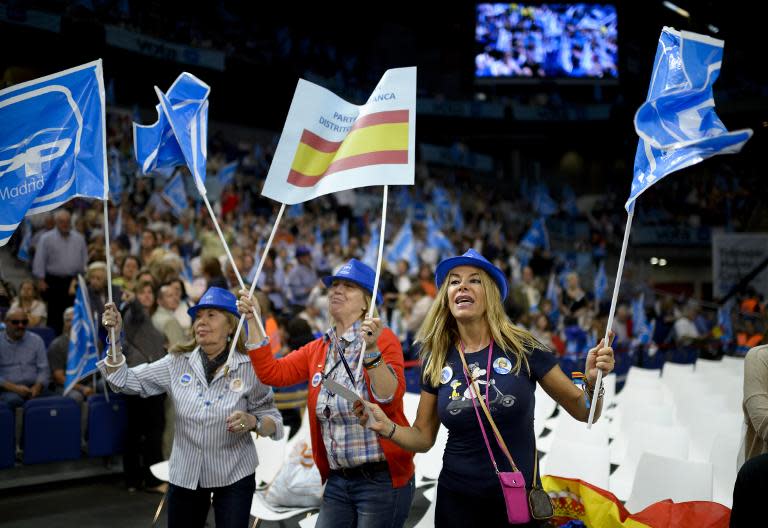Spain's 'Indignados' out to conquer city halls
The Spanish "Indignado" protesters who inspired the worldwide Occupy movement are out to conquer city halls and regional governments across Spain in elections on Sunday. In a key test of Spain's new political dynamic ahead of general elections later this year, new groups formed since the street protests that have swept the country since 2011 are now running for office. Two new parties have emerged as contenders since the popular unrest of the "Indignado" movement which rose up in protest against unemployment, corruption and crisis-linked spending cuts. One is the left-wing Podemos, which is supporting countless smaller "citizen platforms" opposed to the ruling conservative party's austerity measures. "In practically all the main provincial towns there are citizen platforms running for office," said Pablo Simon, a political scientist at Madrid's Carlos III University. "They could decide the result in many cases -- if not by winning the city hall then at least by coming second" and forcing their way into power in coalitions. - 'Historic' change - The second new party is the centrist Ciudadanos, which according to polls is also luring young voters on the right and the left. Opinion polls showed some 30 percent of voters were undecided days before voting in the local elections. The polls also indicated a marked rise in turnout was likely since the last such polls, driven by young voters. The new groups are challenging the two big parties that have taken turns running Spain for more than 30 years: the ruling Popular Party (PP) and the main opposition Socialists. "This is a historic campaign for political change in Spain, just like during the transition" from dictatorship in the 1970s, Ciudadanos leader Albert Rivera said. Polls have consistently shown the PP losing support overall. The protest groups have been polling strongly in Spain's two biggest cities, Madrid and Barcelona. They want to drive out the PP, which will be defending strongholds including the capital and Valencia. "People of Madrid, give a red card to those arrogant people," Podemos leader Pablo Iglesias urged supporters as he concluded campaigning on Friday. "In 2011 we demonstrated on the town squares. In 2015 we will throw them out of power." - General election warm-up - Voters are expected to punish the two big parties for the hardships of the recent economic crisis as well as the corruption scandals that fill Spain's newspapers and airwaves every day. Economic growth is gradually improving, but the unemployment rate was at more than 23 percent at the last count and anti-austerity campaigners say the recovery is not reaching the poorest. Sunday's vote is an important warm-up for Prime Minister Mariano Rajoy as he fights to stay in office in the general election due to take place around November. He insists that a change of government could disrupt Spain's economic recovery. "This is not a time to experiment," he said at the end of campaigning. "You cannot experiment with the interest of the Spanish people." More than 8,000 towns and cities will elect mayors and 13 of Spain's regions will choose new governments with control of key budgets for health and education. Voting begins at 0700 GMT and polling stations close at 1800 GMT.

 Yahoo Finance
Yahoo Finance 


